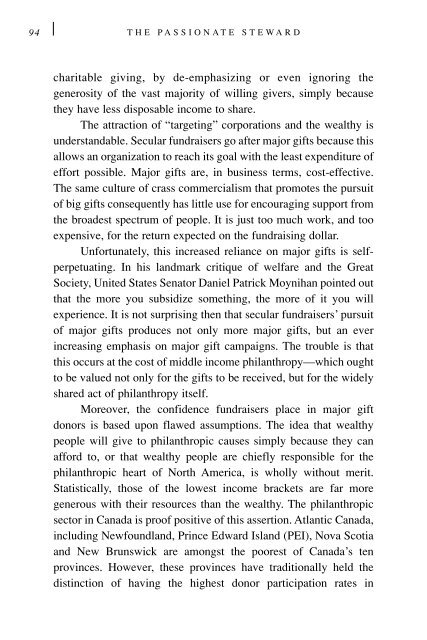Passionate Steward - 10th Anniversary Edition
10th Anniversary Edition of The Passionate Steward - Recovering Christian Stewardship from Secular Fundraising (St. Brigid Press - 2002).
10th Anniversary Edition of The Passionate Steward - Recovering Christian Stewardship from Secular Fundraising (St. Brigid Press - 2002).
You also want an ePaper? Increase the reach of your titles
YUMPU automatically turns print PDFs into web optimized ePapers that Google loves.
94 THE PASSIONATE STEWARD<br />
charitable giving, by de-emphasizing or even ignoring the<br />
generosity of the vast majority of willing givers, simply because<br />
they have less disposable income to share.<br />
The attraction of “targeting” corporations and the wealthy is<br />
understandable. Secular fundraisers go after major gifts because this<br />
allows an organization to reach its goal with the least expenditure of<br />
effort possible. Major gifts are, in business terms, cost-effective.<br />
The same culture of crass commercialism that promotes the pursuit<br />
of big gifts consequently has little use for encouraging support from<br />
the broadest spectrum of people. It is just too much work, and too<br />
expensive, for the return expected on the fundraising dollar.<br />
Unfortunately, this increased reliance on major gifts is selfperpetuating.<br />
In his landmark critique of welfare and the Great<br />
Society, United States Senator Daniel Patrick Moynihan pointed out<br />
that the more you subsidize something, the more of it you will<br />
experience. It is not surprising then that secular fundraisers’ pursuit<br />
of major gifts produces not only more major gifts, but an ever<br />
increasing emphasis on major gift campaigns. The trouble is that<br />
this occurs at the cost of middle income philanthropy—which ought<br />
to be valued not only for the gifts to be received, but for the widely<br />
shared act of philanthropy itself.<br />
Moreover, the confidence fundraisers place in major gift<br />
donors is based upon flawed assumptions. The idea that wealthy<br />
people will give to philanthropic causes simply because they can<br />
afford to, or that wealthy people are chiefly responsible for the<br />
philanthropic heart of North America, is wholly without merit.<br />
Statistically, those of the lowest income brackets are far more<br />
generous with their resources than the wealthy. The philanthropic<br />
sector in Canada is proof positive of this assertion. Atlantic Canada,<br />
including Newfoundland, Prince Edward Island (PEI), Nova Scotia<br />
and New Brunswick are amongst the poorest of Canada’s ten<br />
provinces. However, these provinces have traditionally held the<br />
distinction of having the highest donor participation rates in




